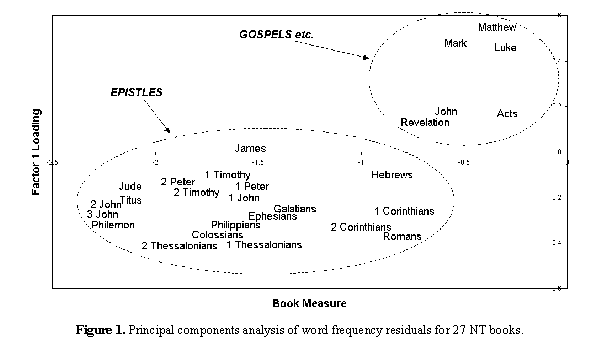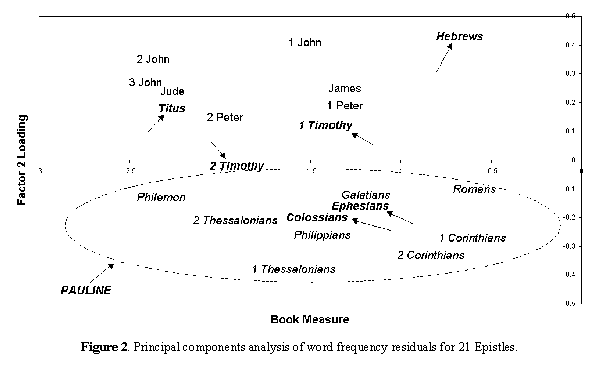

There are many conundrums in the field of literary analysis. Are all the works attributed to an author really by that author? Are there works by an author incorrectly attributed to others? When the writings of a particular author are considered to be authoritative, perceived authorship can have considerable consequence. The 14 (?) Epistles of the Apostle Paul are an example. During the period in which the canonical New Testament was being formed (300 - 400 A.D.), the authorship of the "Epistle to Hebrews" was disputed. It appears that it was its attribution to Paul that won it acceptance. This attribution continues to be made in the "King James" ("AV") version of the Bible. Scholars now raise doubts about Paul's authorship, not only of Hebrews, but of several other Epistles traditionally attributed to him. Just as "Sherlock Holmes" and "James Bond" stories continue to be written, even after the deaths of their original authors, so may others have written under the name of Paul, with or without his approval or knowledge.
One line of inquiry in the field of "stylometry", the statistical analysis of literary style, is in the frequency of usage of particular words. Conventionally, lists of Pauline and non-Pauline words are constructed by scholars. These are then compared with the Epistles. The lists and the comparisons, however, are open to dispute, but Rasch analysis can be an unbiased tool for this literary investigation.
The New Testament comprises 27 books and was written in Greek. In 1894, James Strong constructed a Concordance in which 5624 different indexable Greek words were identified and each assigned a reference number. This classification forms the basis for a measurement analysis of verbal similarities. The data file consists of the 27 books as "persons", and the 5624 Greek words as "items". The observations are the frequencies of words in a book. Frequencies greater than 9 are truncated to 9. No indexable word has a frequency of 9 or more in every book. 169 of Strong's words do not apply to the particular Greek text which forms the basis of this study.
The initial analysis merely measured which words are used most frequently, and which books contain the most words. "Acts" has the most words, 2 John the least. 1470 words appear only once. "God" and "all" are the most common substantively-meaningful words, each appearing 9 or more times in 22 books.
|
Some words negatively correlated with Epistle length So more likely to be encountered in a short Epistle than a long one |
|
Strong's Number - Meaning 4245 elder 48 sanctify 1203 despot 5204 rainy water 2920 accusation 5083 hold fast 5279 remind 1228 devil 784 unspotted |
A more useful finding is that some words are more frequent in short books than in long books, so that their frequencies are negatively correlated with book length. This indicates that there are different word frequency patterns among the books. Accordingly, the word frequencies of negatively correlated were recoded with the reverse values. This changed the measures of the books, revealing further negatively correlated words. The process was repeated until no negative correlations remained. 735 words were reversed; 4720 remained unreversed.
In order to discover what word frequency patterns the books shared, a principal components analysis (PCA) of residuals was performed. As might have been predicted, Figure 1 shows a distinct difference between word frequencies patterns in the 6 narrative books (Gospels, Acts, Revelation) and the 21 Epistles.
The 6 narrative books were dropped from the analysis. There remained 3400 active words, which were rescored to maintain positive correlations. Figure 2 shows the second factor in an analysis of their word frequency residuals. It is reassuring to see that all Paul's scholarly-recognized Epistles are within the oval, along with two books of doubted Pauline authorship, Colossians and Ephesians. Outside the oval are all Epistles definitely by other authors, as well as 4 conventionally attributed to Paul: Hebrews, 1 & 2 Timothy, Titus. It is seen that 2 Timothy could also be attributed to Paul's direct authorship. It is a short personal letter, located in Figure 2 near another short personal letter, but of Paul's undoubted authorship, Philemon. In this analysis, words more distinctive of Paul include "glory" and "proclaim". Words more indicative of other authorship include "hear" and "chief".
An advantage of this type of analysis is that all words participate equally, minimizing scholarly bias. The results can be easily shared, replicated and are open to public scrutiny.
John Michael Linacre
 |
 |
Who wrote Paul's Epistles? Linacre J.M. … Rasch Measurement Transactions, 2001, 15:1 p.800-1
| Forum | Rasch Measurement Forum to discuss any Rasch-related topic |
Go to Top of Page
Go to index of all Rasch Measurement Transactions
AERA members: Join the Rasch Measurement SIG and receive the printed version of RMT
Some back issues of RMT are available as bound volumes
Subscribe to Journal of Applied Measurement
Go to Institute for Objective Measurement Home Page. The Rasch Measurement SIG (AERA) thanks the Institute for Objective Measurement for inviting the publication of Rasch Measurement Transactions on the Institute's website, www.rasch.org.
| Coming Rasch-related Events | |
|---|---|
| Jan. 16 - Feb. 13, 2025, Fri.-Fri. | On-line workshop: Rasch Measurement - Core Topics (E. Smith, Winsteps), www.statistics.com |
| Apr. 8 - Apr. 11, 2026, Wed.-Sat. | National Council for Measurement in Education - Los Angeles, CA, ncme.org/events/2026-annual-meeting |
| Apr. 8 - Apr. 12, 2026, Wed.-Sun. | American Educational Research Association - Los Angeles, CA, www.aera.net/AERA2026 |
| May. 15 - June 12, 2026, Fri.-Fri. | On-line workshop: Rasch Measurement - Core Topics (E. Smith, Winsteps), www.statistics.com |
| June 19 - July 25, 2026, Fri.-Sat. | On-line workshop: Rasch Measurement - Further Topics (E. Smith, Winsteps), www.statistics.com |
The URL of this page is www.rasch.org/rmt/rmt151k.htm
Website: www.rasch.org/rmt/contents.htm